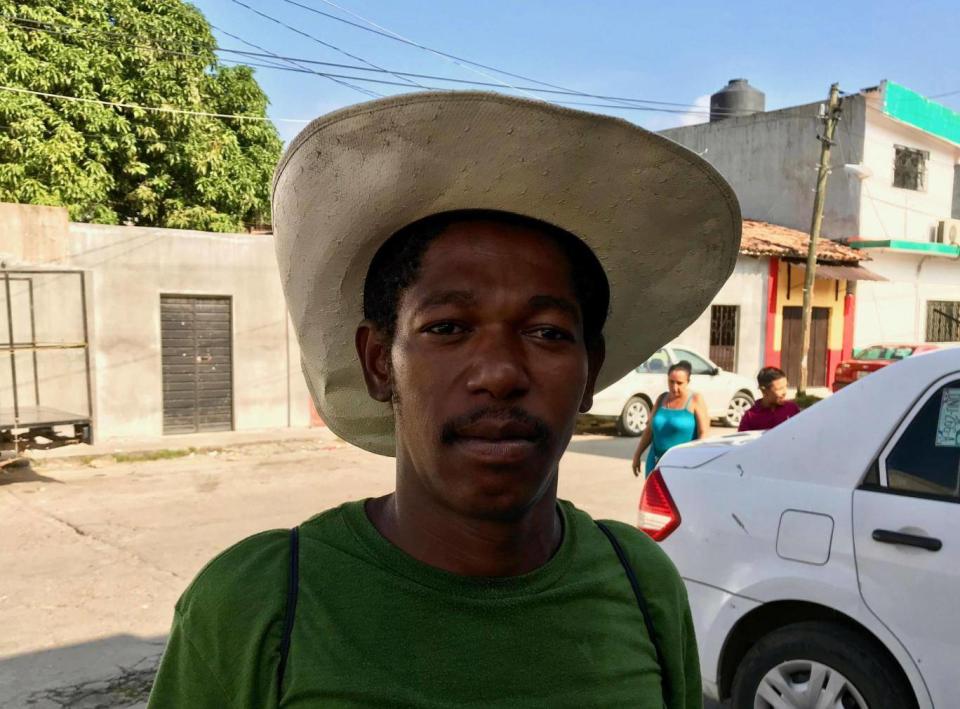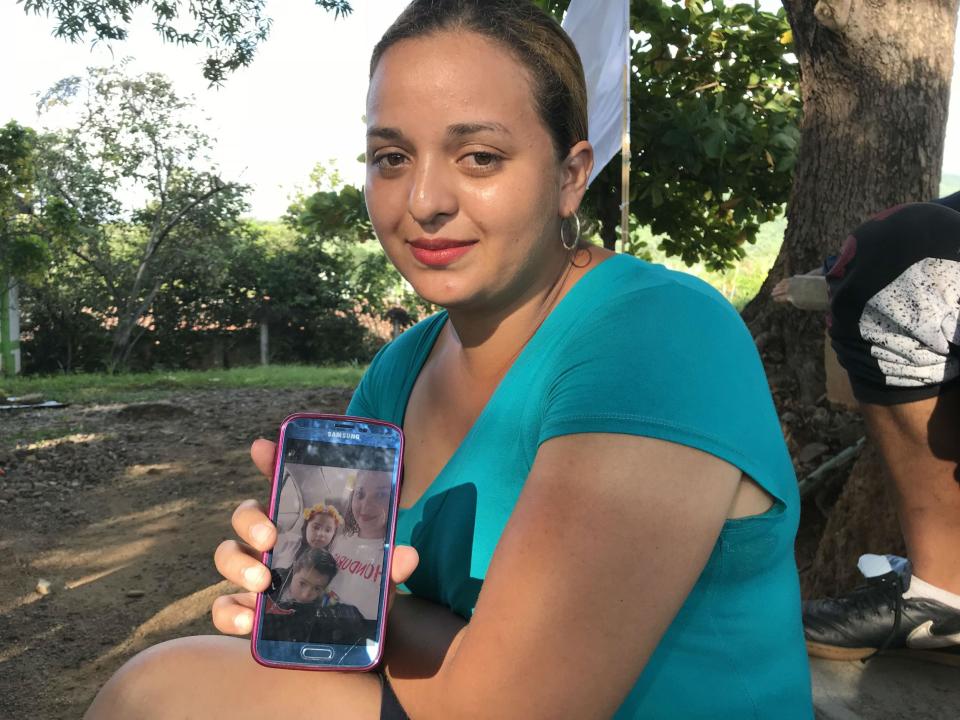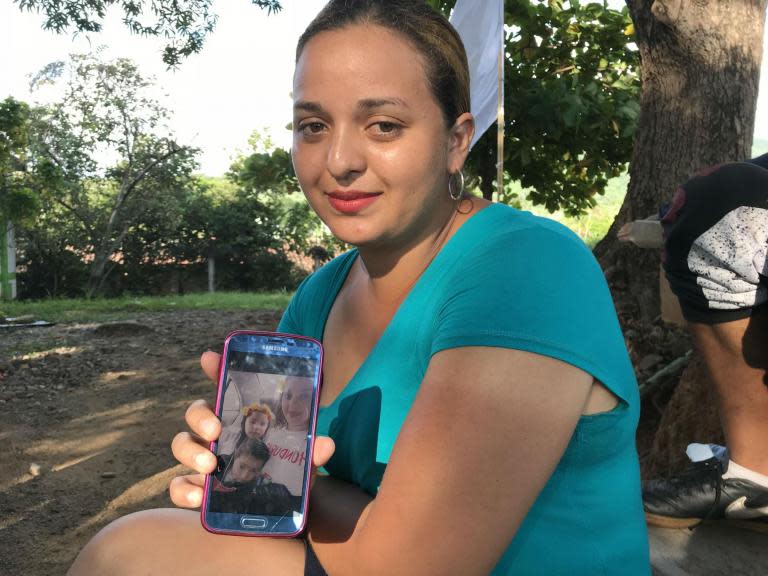Caravan migrants: Single mother explains why she left her two children behind to journey to the US
Ruth Gomez had been calling home to her mother in Honduras every evening, but it was a bittersweet experience. It was good to let her know she was safe, but it was painful too, to speak to her – and especially to her four-year-old son and seven-year-old daughter.
Earlier this month, Ms Gomez and two of her brothers heard about the migrant caravan on television and decided on the spot to join. Now, they were preparing to spend the night in a small park overlooking the town of Pijijiapan, where they had put a white flag that fluttered in the cooling breeze and was inscribed with the words “May peace and God be with us”.
“There are no opportunities for us in Honduras,” she said, wiping away tears as she talked of the decision to leave her children and showing a photograph of them. “I do not think it will be easy to cross [the US border], but also not impossible.”
The testimony of Ms Gomez, which mirrors that of so many migrants making this journey, stands in contrast to a belief held by some in the US that the 10,000 people who set off from countries such as Honduras, El Salvador and Guatemala, had “nothing to lose”. In truth, thousands are leaving behind parents, spouses and children. But they are calculating that the pain and danger is worth the chance of a better life.
All three countries suffer from poverty and devastating violence, much of it connected to gangs and the illicit, deadly trade that feeds the US market for illegal drugs. El Salvador and Honduras frequently top the list of nations outside of a war zone with the highest murder rate per capita.
Ms Gomez said her children’s father was no longer on the scene. This made her more determined to be able to provide for her son Dorian and daughter Alejandra. She had worked in Tegucigalpa, doing bar work and other jobs, but it was not enough to raise a family.
When it was suggested to her she was being brave by embarking on a journey of more than 2,000 miles, she said: “I feel I am not brave because I left the children behind.”
She added: “Our education system is not good. And if the children need to go a doctor, I cannot take them.”
She said she told her children she was leaving – she did not know for how long – and believed her daughter understood. She said her mother Daisy supported her decision and was looking after them.
While the caravan, making its way slowly northwards under blistering sun and in exhausting humidity, contains people from many countries, the majority appear to be from Honduras, which has an average GDP per capita of a little under $2,500.
Jose Hernandez came from the northern coastal city of La Ceiba. He too had left behind three children, two of whom were being cared for by his ex-wife, and a son his mother was looking after. He said he had worked in construction and as a carpenter but daily wages for such jobs ranged from $8-13 (£6.25-10.15).

“We have no work. Everything is broken,” he said, sitting with friends outside a convenience store in Pijijiapan, as they hoped to grab a ride.
He said he had friends in Houston who entered the US legally, which he wanted to do. Those who could not enter legally had to resort to coyotes or people smugglers, who charged between $3,000-$4,500.
How could somebody in Honduras afford such an amount? “You sell everything you have – your phone, your house, everything. Because the idea is you will be able to replace it when you get to the other side.” He added: “Sometimes, you can pay half in advance and then half when you get there … In the case of Trump [threatening to shut the border], I have a lot of faith in God. I hope that he’s going to say ‘Here is your opportunity’.”
In a large warehouse on the outskirts of the city where the migrants were spending the night, a 45-year-old woman from Honduras called Wilma Benetiz said she had left behind all but one of her seven children, a nine-year-old girl called Roxany. The oldest of her children were looking after the younger ones while she tried to enter the US.
“I am a single mother,” she said. “I cannot find any work.”
Sitting next to her was Maria Suyapa, 36, who had joined the caravan with a nephew. She said she had fallen foul of money lenders in the city of San Marcos de Colón when she tried to build a house, and ended up owing them $10,000. There was no way she could make that kind of money in Honduras. “I don’t have a visa but I have to get to the US to pay off this debt.”
On Sunday, the Associated Press said the caravan had reached the city of Tapanatepec, where organisers urged them to rest, following an incident late on Saturday night when a man was beaten while trying to distribute food, and it was wrongly rumoured he had tried to grab hold of a child to protect himself. Municipal security chief Raul Medina Melendez said some in the crowd grew upset when a man with a megaphone urged them to line up and wait their turn for sandwiches and water.
The migrants have been getting up as early as possible, some at 1am, but almost all before dawn, in order to walk as far as possible before the sun rises. When the sun gets really hot between the hours of 11am-2pm, they cover their heads with towels or hats, or shades made from strips of cardboard boxes.
Ms Gomez, the woman resting on the hillside, said the worst part of the journey had been the three days they spent at the border between Guatemala and Mexico, waiting to cross.
The best part had been the reaction the migrants received from ordinary Mexicans, whom themselves live in a a poor region of the country. People had provided food and water, and allowed them to bathe in their homes, she said.
“I want to work,” she said, when asked what was inspiring her to get up every morning and spend 12 hours walking or trying to hitch a ride. “I want to be able to provide for my two children that I had to leave in Honduras.”
Additional reporting Hans-Maximo Musielik



